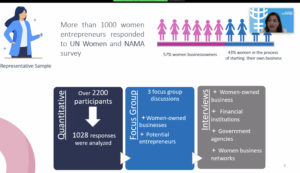NAMA-UN Women Partnership Survey Identifies Challenges Impacting Women-Owned Businesses In The UAE
NAMA Women Advancement Establishment (NAMA) and UN Women have shared the results of a
bi-lingual survey jointly undertaken to determine the structural barriers for women-owned enterprises in the UAE and analyse the impact of COVID-19 on their economic activity.
The results were unveiled on March 8 when the two entities joined hands to commemorate International Women’s Day 2021 and celebrate female entrepreneurship in the UAE at a virtual forum, titled ‘Moving Forward Into Success’.The event was attended by HE Reem BinKaram, Director of NAMA Women Advancement Establishment; Dr Mouza Al Shehhi, Executive Director of UN Women Liaison Office for the GCC; and leading women achievers in the UAE – Theresa Tsui, Co-founder of Skills 3 Creative Enterprise, Halima Jumani, Director of Kibsons and Khulood Al Nakhi, Founder and CEO of Beyond. The event was moderated by Jen Blandos and Kellie Whitehead, Founders of the Female Fusion Network.
The survey is part of an ongoing collaboration between NAMA-UN Women that was forged in 2018 to implement the latter’s Flagship Programme Initiative (FPI) “Stimulating Equal Opportunities for Women Entrepreneurs” aimed at fostering women’s economic empowerment through entrepreneurship and engaging the private and public sectors in gender-responsive procurement practices, in South Africa, UAE, and the wider Middle East region.
As part of this programme, a study was conducted with over 1,000 women-owned businesses (WOB) and potential women entrepreneurs in the UAE, to expand knowledge on size of businesses owned by women, sectors, activities, impact of COVID 19 on businesses, financial challenges, marketing barriers, and training and support needs.
The data collected will set the foundation for tailoring the FPI in the UAE with actionable steps to undertake advocacy and make further progress on WOB’s inclusion within supply chains.
Key survey findings
41.2% of WOB surveyed cited lack of access to markets as the main challenge hindering their economic activity, while 39% said it was the unmet demand for credit or lack of access to finance that impacted the growth of their business. 72% of those surveyed were micro enterprises with less than 5 employees.
In addition, 50% of respondents had never participated in a procurement tender, while 33.8% cited the lack of transparent, centralised information about the business registration requirement, procedures, and market information, as hindering growth.
The gender-based challenges impacting WOB in UAE were largely socio-cultural in nature with many respondents citing difficulties in balancing both household and business responsibilities. The respondents also called for strengthening women-led professional and social networks.
The survey revealed that 63% respondents witnessed a drop in sales due to COVID-19 pandemic in the UAE with an average decrease in revenue by 58%. However, to mitigate the risks, 43.1% shifted their services online while 37.9% have enabled remote working for employees.
The survey also found that the aftershocks of the pandemic had led to challenges in business continuity. 75% respondents noted that they had not benefited from any government relief or stimulus benefits, and emphasised that they require more guidance on how to benefit.
Survey will enable an FPI for the UAE tailored to the needs of businesswomen and entrepreneurs
Commenting on the findings of the NAMA-UN Women partnership survey, Reem BinKaram, Director of NAMA Women Advancement Establishment, said: “The survey has given us a deeper understanding of the challenges directly impacting women’s economic activity in the UAE. Based on the findings, NAMA-UN Women will collaborate to bridge the gaps and take effective measures to ensure inclusive and sustainable growth for women entrepreneurs in the UAE through an FPI tailored to fit their requirements.”
Dr Mouza Al Shehhi, Executive Director of UN Women Liaison Office for the GCC, added, “As we mark International Women’s Day 2021, we are proud to roll out The Flagship Programme in the UAE in partnership with NAMA. This is testament to the UAE’s commitment to women’s economic empowerment and leadership, which is a core UN Women mandate. As a first step, the in-depth research conducted will enable us to work with different stakeholders who are key to the success of women in business, to address specific concerns and barriers that are rooted in insights and research findings.”
Global outreach of FPI
The NAMA-UN Women partnership was forged in 2018 to respond to the gap in women’s access to procurement markets and address both demand and supply side constraints.
Implemented in partnership with governments, the private sector, UN entities, investors, civil society, women entrepreneurs, and women’s enterprise associations over a three-year-period, the Flagship Programme Initiative seeks to benefit thousands of female entrepreneurs, especially those living in poverty and facing heightened social discrimination, by promoting their access to entrepreneurial skills and finance opportunities so that they can benefit from global value chains.
Over 4,800 women entrepreneurs in South Africa received training in digital literacy since the COVID-19 outbreak. Meanwhile, learning platforms and capacity development programmes in high-value sectors are currently under development to benefit 5,000 women entrepreneurs. Their trainings will be led by business mentors and expert coaches.
The FPI team has also played a key role in data collection and analysis for the COVID-19 Global Gender Response Tracker that included over 2,500 measures across 206 countries and territories.






